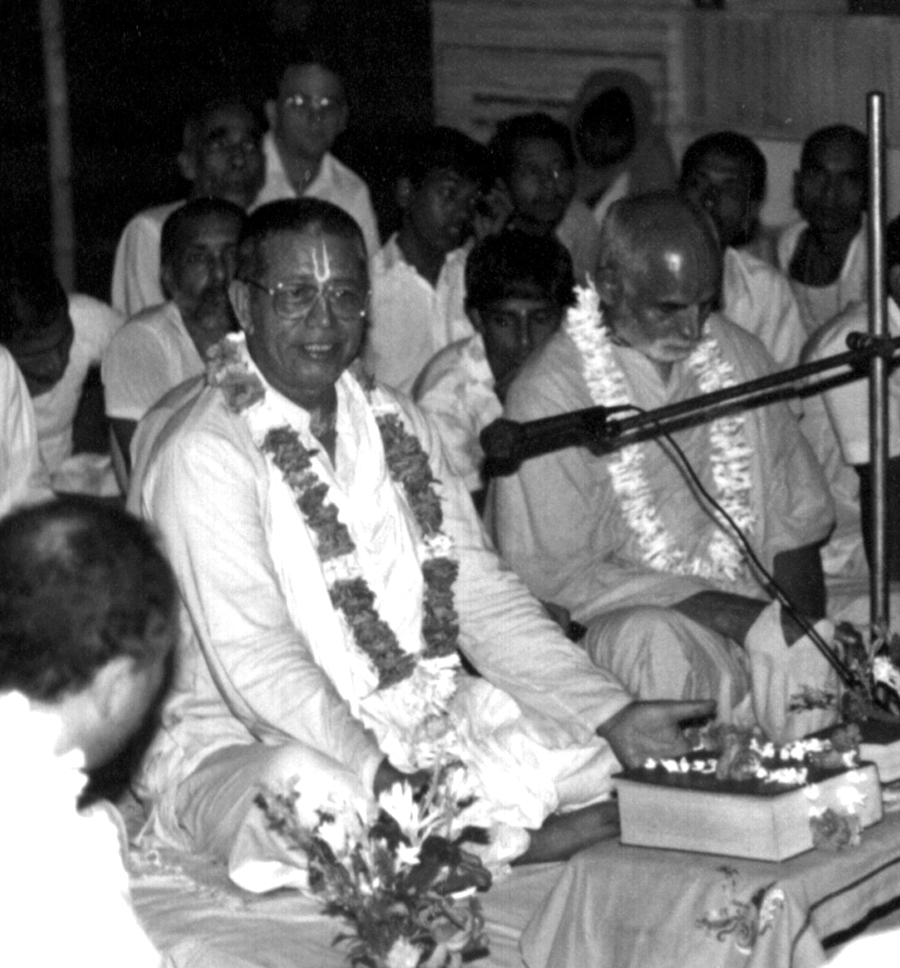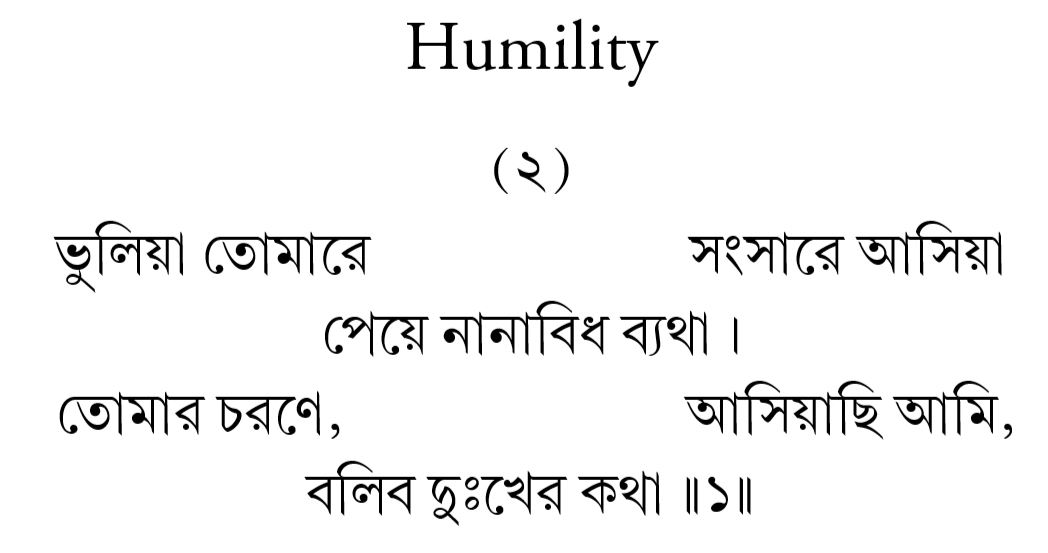We must always be humble. Maya will give many tests but we must try to tolerate everything and realise why such things are happening. Furthermore, if we want to remain peacefully we must give honour to others. If we do not disturb others but give honour to them, they will not disturb us. They will think, “This person is very innocent. He is not against me, furthermore he nourishes me by giving me respect, so I must not disturb him.”

Mahaprabhu always wants that His devotees have peace in order to practise spiritual life. Such peace is only possible if the devotees are humble and tolerant, and if they give honour to others. The devotee will think, “I do not want to see whether someone is an honourable person or not, but I know my own position is that of an insignificant soul who is aspiring to be a servant of the servants of the servants of Krishna. So if someone wants any honour from me I must immediately give it to him and not give him any chance to think me to be an enemy.”
We can see an example in the Pastimes of Srila Rupa Goswami who was approached by a digvijaya pandit, a big world-renowned scholar. Hearing of Rupa Goswami’s name and fame he went to him and challenged: “If you cannot defeat me then give me your certificate by signing a statement that you have been defeated by me.”
Rupa Goswami thought, “I have no time to talk with that man.” He therefore asked, “Where is your paper? I shall sign it.” He then wrote to the effect that, “This man is a great pandit and I have been defeated by him,” and he signed it. This is the nature of the pure devotees, they do not want to cause disturbance or trouble to others. They are well aware that everything here is a passing show. People think that what they have is their wealth, but we neither know when we shall die nor where we shall go after death. Our duty is to prepare ourselves for the service of Krishna, and *that* is the real wealth of our lives. Our only shelter is to serve Krishna, therefore we do not want to waste our time with worldly affairs.
This is one mood of the devotees, and another is shown by Jiva Goswami Prabhu. He wanted to rectify that digvijay pandit, and therefore chastised him: “You went to see Rupa Goswami but you do not know who he is. You think yourself to be a great pandit, but now I consider you to be very foolish. You went to the ocean of ecstasy but you did not receive even one drop of that ecstasy. You went there but came back empty handed, therefore I consider you to be very foolish. You do not know who Rupa Goswami and Sanatan Goswami really are, therefore you went to defeat them. You have made a great offence to them. I am their disciple and if you want to examine me then go ahead, by which you may understand something of their greatness.” Anyhow, that digvijay pandit received the mercy of Jiva Goswami and was defeated by him within a few minutes. He could understand he had made much offence to Rupa and Sanatan, and, by Jiva Goswami’s mercy, he left his ego. The pandit immediately returned to Rupa Goswami and Sanatan Goswami and, apologising, took shelter of them. Jiva Goswami was happy that he was able to do some service to his Guru by rescuing this digvijay pandit from illusion.
Following this incident, Rupa Goswami, in order to teach us, showed some unhappiness towards Jiva Goswami: “You have come here to Vrndavan but now it seems through this incident that you want to acquire mundane fame.” This, however, was not the desire of Jiva Goswami, his intention was to glorify his Guru, correct the digvijay pandit, and bestow mercy upon him. This lesson is from one of the many incidents in the lives of our Acharyas.
Excerpt from Dignity of the Divine Servitor, compiled from the talks of Srila Gurudev.
Tag: humility
Bhuliya Tomare
Srila Gurudev singing Bhuliya Tomare, December 1989.
Download mp3 audio file
bhuliyā tomāre, saṁsāre āsiyā,
peye nānā-vidha vyathā
tomāra charaṇe, āsiyāchhi āmi,
baliba duḥkhera kathā
bhuliyā–forgetting; tomāre–about You; saṁsāre–in the material world; āsiyā– coming; peye–experiencing; nānā–various; vidha–forms; vyathā–of suffering; tomāra–Your; charaṇe–at the feet; āsiyāchhi–have come; āmi–I; baliba–will say; duḥkhera–of distress; kathā–tale.
[1] Forgetting You and coming to the material world, I have undergone all sorts of suffering. Now I have come before Your feet and will express my tale of distress.
jananī-jaṭhare, chhilāma yakhana,
viṣama bandhana-pāśe
eka-bāra prabhu! dekhā diyā more,
vañchile e dīna dāse
jananī–of my mother; jaṭhare–in the womb; chhilāma–I was; yakhana– when; viṣama–terrible; bandhana–binding; pāśe–with the ropes; eka–one; bāra–time; prabhu!–O Lord!; dekha–sight; diyā–giving; more–to me; vañchile–deprived; e–this; dīna–poor; dāse–to this servant.
[2] While I was bound in the terrible confines of my mother’s womb, You once revealed Yourself to me, O Lord! Yet since then You have deprived this poor servant.
takhana bhāvinu, janama pāiyā,
kariba bhajana tava
janama ha-ila, paḍi’ māyā-jāle,
nā ha-ila jñāna-lava
takhana–then; bhāvinu–I thought; janama–birth; pāiyā–obtaining; kariba–I will do; bhajana–service; tava–Your; janama–birth; ha-ila–happened; paḍi’– falling; māyā (māyāra)–of Māyā; jāle (phā̐de)–into the net (trap); nā–not; ha-ila–became; jñāna (jñānera)–of knowledge; lava (leśa)–a fraction (trace).
[3] At that moment I thought I would engage in Your service after taking birth. Yet when I was born, I fell into māyā’s trap, and not a trace of such consciousness remained.
ādarera chhele, svajanera kole,
hāsiyā kāṭānu kāla
janaka-jananī- snehete bhuliyā,
saṁsāra lāgila bhāla
ādarera–of adoring parents; chhele–a son; svajanera–of relatives; kole–in the lap; hāsiyā–smiling, laughing; kāṭānu–I passed; kāla–time; janaka–of my father; jananī–of my mother; snehete–due to the affection; bhuliyā–forgetting; saṁsāra–family life, the material world; lāgila–felt; bhāla–good.
[4] As a son of adoring parents, I spent my time in their laps, smiling and laughing. Because of my mother and father’s affection, I forgot You and took pleasure in family life (material existence)
krame dina dina, bālaka ha-iyā,
khelinu bālaka saha
āra kichhu-dine, jñāna upajila,
pāṭha paḍi ahar-ahaḥ
krame–gradually; dina–day; dina–day; bālaka–a boy; ha-iyā–becoming; khelinu–I played; bālaka–boys; saha–with; āra–more; kichhu–some; dine– after days; jñāna–faculty of knowledge; upajila (udita ha-ila)–arose; pāṭha– lessons; paḍi–I study; ahar-ahaḥ (dina dina, sarva-kṣaṇa)–day after day (all the time).
[5] Day by day I grew into a young boy and played with other young boys. Later on my intellect developed, and I studied my lessons day in and day out.
vidyāra gaurave, bhrami’ deśe deśe,
dhana upārjana kari’
svajana-pālana, kari eka-mane,
bhulinu tomāre hari!
vidyāra–of learning; gaurave–on the strength; bhrami’–travelling; deśe–in country; deśe–in (another) country; dhana–wealth; upārjana–earning; kari’–doing; svajana–relatives; pālana–maintenance; kari–I do; eka–single; mane–with a mind; bhulinu–I forgot; tomāre–about You; hari!–O Lord!
[6] Then on the strength of my learning, I travelled from place to place, earned money, and maintained my family with undivided attention. I forgot You, O Lord!
vārddhakye ekhana, bhakati-vinoda,
kā̐diyā kātara ati
nā bhajiyā tore, dina vṛthā gela,
ekhana ki ha’be gati?
vārddhakye–in old age; ekhana–now; bhakati-vinoda–Bhakti Vinod; kā̐diyā–crying; kātara–distressed; ati–very; nā–not; bhajiyā–serving; tore–to You; dina–days; vṛthā–vain; gela–passed; ekhana–now; ki–what?; habe–will be; gati–destination.
[7] Now aged, Bhakti Vinod cries in great distress, “Not serving You, I have passed my days in vain. What will be my fate now?”
(prabhu ei bār āmāy dayā kara)
Lord, give Your mercy to me this time.
(patita pāvan gaurahari ei bār āmāy dayā kara)
Saviour of the fallen Gaurahari, give Your mercy to me this time.
(tomāra śrī charaṇe śaraṇ diyā ei bār āmāy dayā kara)
Give me the shelter of Your feet; give me Your mercy this time.
(tomāra śrī charaṇe sevā diyā ei bār āmāy dayā kara)
Give me the service of Your feet; give me Your mercy this time.
(sapārṣada gaurahari ei bār āmāy dayā kara)
Gaurahari with Your associates, give Your mercy to me this time.
(hari he, hari he, hari he!)
Oh Lord!
(nitāi gauraharibol, haribol, haribol, haribol!)
Chant “Nitai Gaurahari”! Chant “Hari”!
The main text of the song here is taken from Sharanagati, by Srila Bhakti Vinod Thakur.

